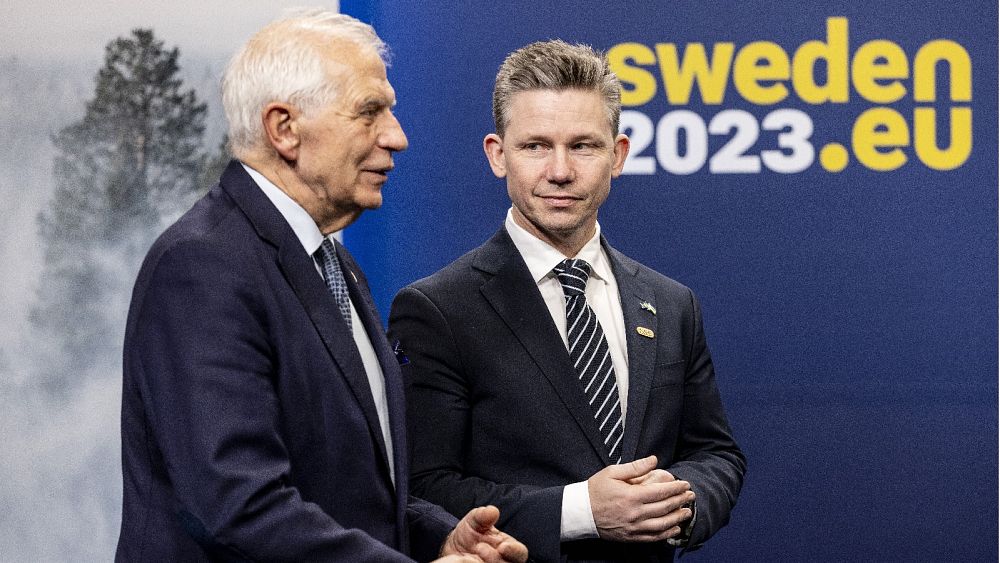
The European Union is prepared to disburse a further €2 billion to boost ammunition production and deliveries to Ukraine, Josep Borrell said on Wednesday.
Speaking from Stockholm where EU defence ministers had gathered for an informal summit to discuss plans for weapons joint procurement to boost ammunition deliveries to Ukraine and replenish depleted domestic stockpiles, the bloc’s top diplomat stressed that “time is of the essence.”
“We need to deliver more, but we need to deliver faster,” he said.
Talks in Stockholm were based on a plan put forward by Borrell centred around three pillars: ramp up deliveries from remaining stockpiles, boost production of ammunition across the 27 member states through joint procurement, and increase the bloc’s defence industry’s capacity for the longer term.
Ukrainian Defence Minister Oleksiy Reznikov, who joined the gathering, told reporters ahead of the meeting that his country needs “one million ammunitions for 155-millimetre artillery systems” as well as more infantry fighting vehicles including tanks.
“Normally it would be nice to have 90,000 or 100,000 (ammunition rounds) per month to be ready to deter enemies and be ready to go with the counteroffensive campaign,” he added.
Estonia had come to the meeting with its own plan for a €4 billion voluntary fund while Borrell had said €1 billion from the European Peace Facility — an off-budget fund member states can tap into to get part of what they have provided Ukraine reimbursed — could be made available.
‘The sooner we start, the better’
The €2 billion tentatively agreed by ministers would see member states provide €1 billion worth of ammunition from their remaining, but quickly depleting stockpiles, and place orders for an additional €1 billion.
The latter — which is Borrell’s second track — would be done collectively, with member states putting in their bids together in the hope it will lead to lower prices and faster delivery times.
Asked how quickly this joint procurement mechanism could start bearing fruits, Borrell said: “I don’t have a crystal ball, but I know the procedure.”
“Member states who are willing to participate, they have to agree on the terms of the procedure. Once we decide the total amount, then it’s a negotiation between the 15 European firms that are able to produce this kind of weaponry in order to fix a price and a time delivery.
“It’s not going to be short, but the sooner we start, the better,” he said, adding: “I hope that by the end of the month, we can arrange with member states who are willing to participate.”
The idea is that if member states know European manufacturers can ramp up production, they will be more willing to give their current ammunition to Ukraine, secure in the knowledge that they will be able to replenish their own stockpiles quickly.
The third pillar, seen as a more medium-term objective, plans for the increase in the capacity of European manufacturing.
It is yet unclear where the money for this will come from for this but Thierry Breton, the EU’s internal market commissioner, told reporters on Wednesday morning that the Commission “will be ready to put also some money from our budget to speed up the ramping up of our defence industry”.
He also urged the finance sector to support the defence industry and came out in favour of allowing the European Investment Bank (EIB) to provide financing to the sector too.
Currently, the EIB is prohibited from investing in core defence activities or assets which include ammunition and other weapons.
Borrell expressed hope foreign and defence ministers will reach a “concrete and formal decision” on the package when they gather in Brussels on March 20, three days before EU heads of state will convene in the Belgian capital for their own summit.
‘Cannot draw definitive conclusions’ on Nord Stream sabotage
One of the topics that had threatened to overshadow ammunition talks for Ukraine was the sabotage of the Nord Stream pipelines following the release of new intelligence that suggests a pro-Ukrainian saboteur group may have been behind it.
The September 26, 2022 bombings took place in international waters in the Baltic Sea, near the Danish island of Bornholm. The explosions damaged the pipelines connecting Russia and Germany releasing tonnes of Russian gas into the Baltic.
The sabotage came after Russia had already sharply reduced gas deliveries to Europe, initially citing technical issues before demanding the lifting of EU sanctions.
Borrell told reporters that “as long as investigations are ongoing, we cannot draw definitive conclusions.”
“I have to wait for having a clear understanding of what has happening,” he said, adding that the incident sharply underlined that “we have to be much more vigilant about the resilience of our critical infrastructure, because what has happened with the Nord Stream two may happen tomorrow with a cable of optic fibre or an electric cable supplying electricity from one country to another below the sea.”
Reznikov had earlier in the day called the new intelligence “a little bit strange story” and said “it’s nothing with us.”
“I think that (the) investigation of official authorities will describe every detail. It’s like a compliment for our special forces but this is not our activity,” he added.

